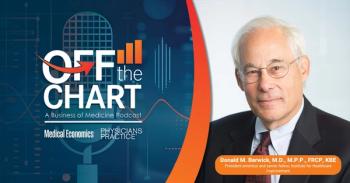
Medicare's Sleight of Hand
Medicare's new payment program under MACRA will place pressure on independent physician practices, as they compete for limited Medicare bonuses.
Sleight of hand (SOH) is the art of distracting the observer and keeping them from "seeing" what is really happening. In magic, it is entertaining. In healthcare, it can be disturbing. SOH has long been used in the healthcare marketplace to accomplish the goal of lowering costs. In 1997, legislation was passed to set a process where an annual budget reflecting GDP increases for Medicare was set (the Sustainable Growth Rate - SGR). If costs exceeded the annual budget, there would be an adjustment to reimbursements to cover that deficit in the next fiscal year.
This approach resulted in a decade of SOH, where off-sheet deficits kept moving forward to the next fiscal year, rather than create an adjustment in the subsequent year of physician Medicare fees. While not exactly generally accepted accounting principles (GAAP), the ever increasing SGR deficit became the responsibility of the political leadership and was effectively ignored by Congress, which passed seventeen annual "patches" that kept reimbursement rates from dropping. Since it is not a good idea to upset physicians politically, this SOH was effective until the weight of the deception exceeded $200 billion. The SGR was finally repealed in April 2015 and replaced with the Medicare Access and CHIP Reauthorization Act of 2015 (MACRA).
For years, physicians worried about reductions in the rate of pay that they received per visit and per event, but it really did not happen. In fact, over time, physicians became inured to the threat. There were even small increases in the fee schedules for Medicare. Why worry, when the deficit is not on your watch? SOH at its best.
Now we are facing an even more interesting healthcare SOH. Practices are asked to collect more information, keep up or increase quality of care, and also reduce overall costs to the system. How do you ask for more and pay less? Try SOH.
Let's start with the insurance company's SOH. Insurers have consistently paid larger entities more per medical service than smaller entities. Why? For the same reason that Walmart became the largest retailer - it costs less to deal with larger entities than smaller ones (until they become big enough to tell you what they are willing to pay). So short term profits go up for the insurer, compensation to the doctor goes up (until the bureaucracy swallows up all of that benefit), and ultimately, there is less competition. Remember, insurers make money by laying their overhead on top of the costs, not a big incentive to reduce delivery costs. Now that there are fewer insurers and in almost every state one insurer dominates, the market for insurance is less competitive, not more competitive. The delivery system is less competitive. Global cost goes up. Simple SOH on the part of insurers.
The next SOH is shifting the risk of delivery cost to the providers. Let's say that CMS wants to reduce Medicare costs by about 3 percent to 5 percent. It says that it will pay a bonus to those providers who save the system money and penalize those who cost the system money. The carrot is not very large, and it will benefit 25 percent or less of the providers. It means that 75 percent of providers will take a 9 percent reduction in their compensation, and a small number of providers will benefit slightly. The incentive will be based on quality measures as well, even though it is difficult to define quality of care, which may include patient satisfaction measures. The hand is quicker than the eye. Medicare costs should go down, but it will not be by a global reduction of Medicare fees, just a competitive one where the providers all fight for a small benefit. The game hides the process. What a brilliant SOH.
I am not saying that there is no need to control costs. What I am saying is that SOH can potentially make the cost of medicine go down and does give credence to the need for maintaining quality. That is not all bad. But it also means that overall, reimbursement for physicians and other providers will be lower.
So what do doctors and delivery systems do? They all merge to get the better deals from insurers in hopes of being on the winning side of the deal and gain a greater chance to be in the small pool of winners for Medicare - another SOH. Should we reduce costs? I think we have no choice in a third-party payer world.
Newsletter
Optimize your practice with the Physicians Practice newsletter, offering management pearls, leadership tips, and business strategies tailored for practice administrators and physicians of any specialty.






